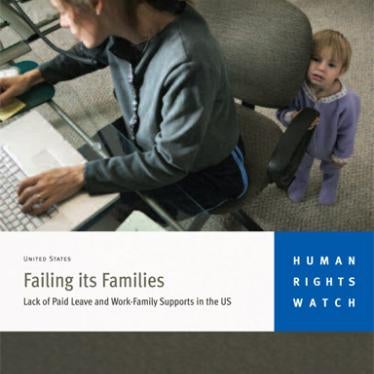Last year for Mother’s Day my kids gave me a scribbled drawing, a chunky bead necklace, and a big jar of Nutella. They know how to make me happy. No doubt they’ll spoil me again on Mother’s Day this year.
But when it comes to US policies and employment practices, moms aren’t spoiled. We’re stiffed.
Take the lack of a national law on paid family or parental leave. Experts at McGill and Northeastern universities have found that at least 178 countries have national laws requiring paid leave for new mothers, and more than 50 guarantee this for new fathers. Only 3 definitely have no national law on paid leave for new moms: Papua New Guinea, Swaziland, and the United States.
The federal Family and Medical Leave Act enables some workers to take 3 months of unpaid leave to care for a new baby or sick family member. But close to half the workforce is not eligible, and many cannot afford unpaid leave. Only Californiaand New Jerseyguarantee paid family leave under law, financed by minimal worker payroll contributions. We’re missing out on the benefits that many other countries have seen from paid leave for moms: increased breastfeeding, immunizations, and health visits for babies; lower infant mortality and postpartum depression; higher productivity and employee morale; and decreased turnover costs.
Nor is there a national law requiring paid sick leave, and what mom couldn’t use that? Nearly four in ten private sector workers lack paid sick leave for themselves (especially in women-dominated industries), and millions more lack paid leave to care for an ill child. Almost a quarter of US adults report that they have lost or were threatened with losing a job for taking time off due to illness. Just a few cities and one state have laws requiring paid sick leave. A study on San Francisco’s paid sick leave ordinance showed that business profitability did not suffer and that most employers reported no difficulty in complying. Among industrialized countries, only the US and South Korea lack sick leave legislation.
Then there’s the pay gap. Many people know that women earn roughly 78 cents for every dollar earned by men. But the pay gap is even bigger for mothers, whoearn about 7 percent less per child than childless women even after statistically controlling for other variables. Nearly half of the wage gap between men and women is due to occupational differences. But even after controlling for occupation, education, and experience, about 40 percent of the wage gap remains. Employer bias is undoubtedly a factor. A 2007 study found that equally qualified mothers were significantly less likely to be recommended for hire, were less likely to be rated as promotable, and were offered much lower starting salaries than fathers and women without children.
And how about affordable child care policies? Nearly 11 million children under age 5 are in child care every week. Child care costs are high, and subsidized care is hard to come by. A 2011 report found that the average annual cost for center-based infant care was higher than a year’s tuition and fees for a four-year public college in 36 states, and exceeded annual median rent payments in 24 states. The federal Child Care and Development Block Grant allocates funds to states for child care for low-income families. But only one in six eligible children receives assistance.
Finally, even employment discrimination laws fall short for parents: federal laws do not explicitly bar employers from discriminating against workers with family responsibilities. The law does say that employers cannot fire, refuse to hire, deny a promotion, or deny benefits to a woman because she is pregnant. But some do, and reported cases are on the rise. The number of pregnancy discrimination charges filed with the Equal Employment Opportunities Commissionclimbed from 3,977 in 1997 to 5,797 in fiscal year 2011.
These policy failings impact not just mothers, but whole families. Women constitute roughly half the workforce, and policies need to support them and their partners in reconciling work and family obligations.
Mother’s Day this year would be a lot happier if more policymakers understood this.







